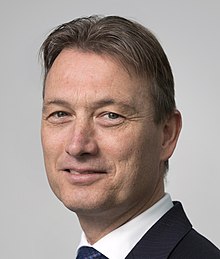
Jeanine Antoinette Hennis-Plasschaert is a Dutch politician and diplomat who has been serving as United Nations Special Coordinator for Lebanon since May 2024. She is a member of the People's Party for Freedom and Democracy (VVD).
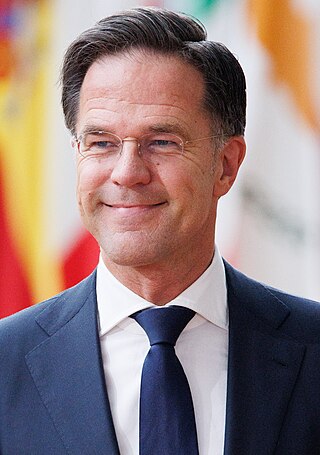
Mark Rutte is a Dutch politician who has served as the 14th secretary-general of NATO since October 2024. He previously served as the prime minister of the Netherlands from 2010 to 2024, and as the leader of the People's Party for Freedom and Democracy (VVD) from 2006 to 2023. Serving a total of almost 14 years, Rutte is the longest-serving prime minister in Dutch history.

The minister of foreign affairs is the head of the Ministry of Foreign Affairs and a member of the Cabinet and the Council of Ministers. The incumbent minister is Caspar Veldkamp of the New Social Contract (NSC) party, who has been in office since 2 July 2024. Regularly, a state secretary is assigned to the ministry who is tasked with specific portfolios, currently the function is not in use. Additionally since 1965 there has been a minister without portfolio assigned to the ministry, the minister for foreign trade and development cooperation has traditionally development cooperation as portfolio, since 2012 the portfolio of trade and export has been assigned added to the function.
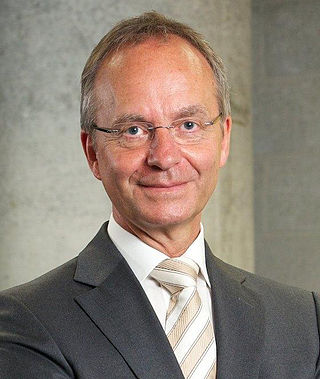
Henricus Gregorius Jozeph "Henk" Kamp is a Dutch politician of the People's Party for Freedom and Democracy (VVD) who was Minister of Defence in the Cabinet Rutte III from 24 September 2021 to 10 January 2022. He previously was Minister of Defence in the Cabinets Balkenende I, II and III from 12 December 2002 until 22 February 2007.

Atzo Nicolaï was a Dutch politician of the People's Party for Freedom and Democracy (VVD) and businessman.
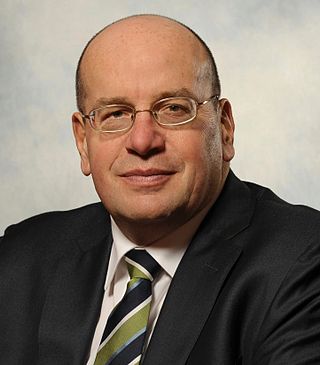
Fredrik "Fred" Teeven is a Dutch jurist, bus driver and former politician and prosecutor. A member of the People's Party for Freedom and Democracy (VVD), he served as State Secretary at the Ministry of Security and Justice from 2010 until his resignation in 2015 alongside that of Minister Ivo Opstelten.
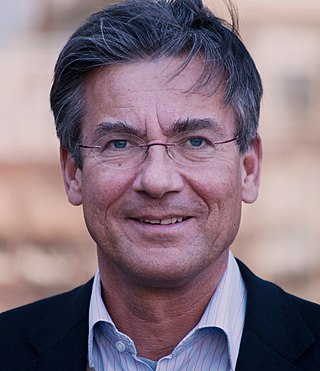
Maxime Jacques Marcel Verhagen is a retired Dutch politician and historian. A member of the Christian Democratic Appeal (CDA), he served as Deputy Prime Minister of the Netherlands from 2010 to 2012 under Prime Minister Mark Rutte.

Edith Ingeborg Schippers is a Dutch politician of the People's Party for Freedom and Democracy (VVD) and businesswoman who served as President of DSM Netherlands between 2019 and 2023.

Stephanus Abraham "Stef" Blok is a Dutch politician who served as Minister of Economic Affairs and Climate Policy in the Third Rutte cabinet from 25 May 2021 till 10 January 2022. He is a member of the People's Party for Freedom and Democracy (VVD).

Paul de Krom is a Dutch business executive and former politician of the People's Party for Freedom and Democracy (VVD). He has been CEO and Chairman of the Organisation for Applied Scientific Research from March 2015 till February 2022, and CEO and Chairman of the Energy Research Centre since 1 April 2018. He has also served as Chairman of the Distribution association since 3 April 2018.
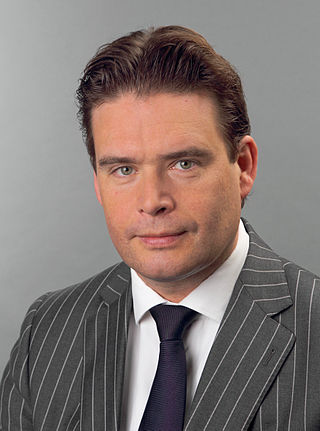
Frans Hubertus Henricus Weekers is a Dutch politician of the People's Party for Freedom and Democracy (VVD) and lawyer.

Gerard Adriaan "Ard" van der Steur is a retired Dutch politician of the People's Party for Freedom and Democracy (VVD) and lawyer.

Wouter Koolmees is a Dutch economist and politician and of the Democrats 66 (D66) party who served as Minister of Social Affairs and Employment in the Third Rutte cabinet from 2017 to 2022. He also served as second Deputy Prime Minister of the Netherlands from 2019 to 2020 during Kajsa Ollongren's medical leave of absence. He is also the CEO of Nederlandse Spoorwegen.
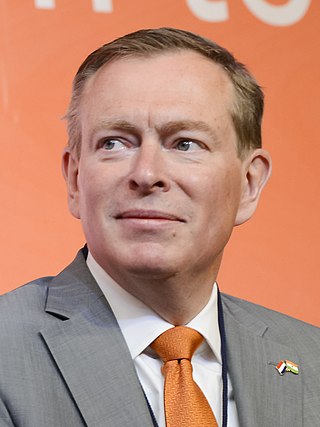
Bruno Johannes Bruins is a Dutch politician of the People's Party for Freedom and Democracy (VVD) who served as Minister for Medical Care in the Third Rutte cabinet from 26 October 2017 to 19 March 2020, when he resigned. He previously served as State Secretary for Education, Culture and Science from 29 June 2006 until 22 February 2007 in the Second and Third Balkenende cabinets.

The second Rutte cabinet, also called the Rutte–Asscher cabinet, was the executive branch of the Government of the Netherlands from 5 November 2012 until 26 October 2017. The cabinet was formed by the conservative-liberal People's Party for Freedom and Democracy (VVD) and the social-democratic Labour Party (PvdA) after the election of 2012. The cabinet was a centrist grand coalition and had a slim majority in the House of Representatives. VVD Leader Mark Rutte served as Prime Minister; prominent PvdA politician Lodewijk Asscher, a former alderman of Amsterdam, served as Deputy Prime Minister and Minister of Social Affairs and Employment.
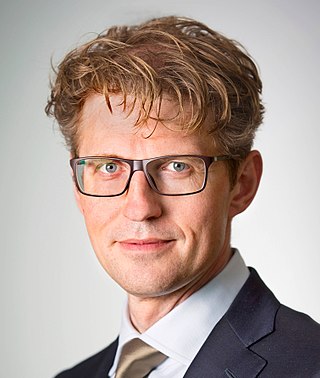
Sander Dekker is a Dutch politician who served as Minister for Legal Protection in the Third Rutte cabinet from 2017 to 2022. A member of the People's Party for Freedom and Democracy (VVD), he previously served as State Secretary for Education, Culture and Science under the Second Rutte cabinet from 2012 to 2017.

The third Rutte cabinet was the cabinet of the Netherlands from 26 October 2017 until 10 January 2022. It was formed by a coalition government of the political parties People's Party for Freedom and Democracy (VVD), Christian Democratic Appeal (CDA), Democrats 66 (D66) and Christian Union (CU) after the general election of 2017.
